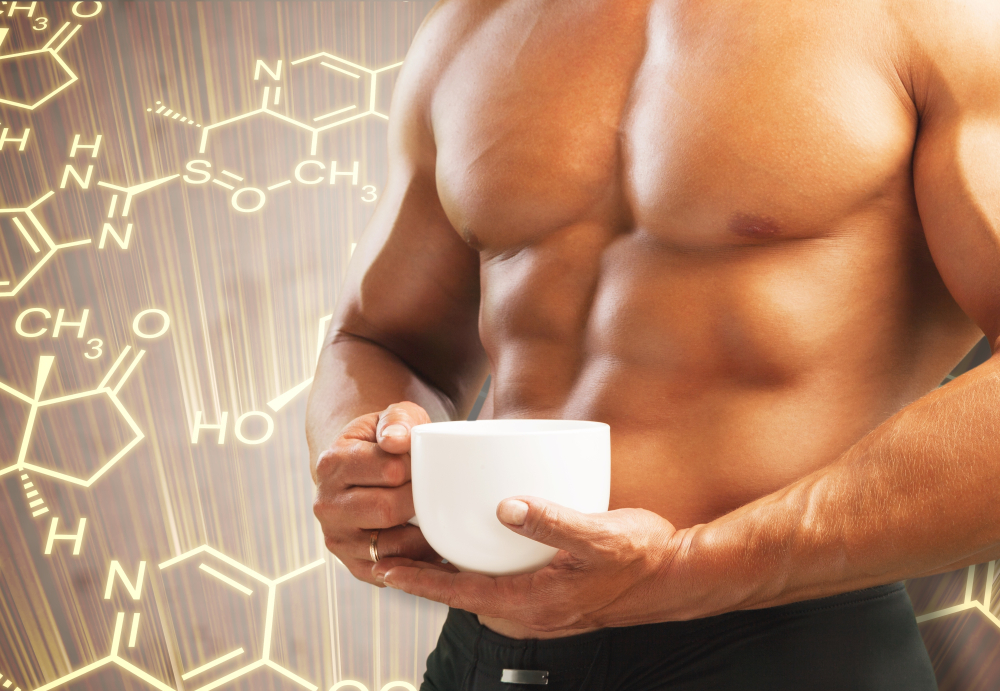Boost Your Drive | Tips for the High Libido Man
In contemporary society, discussions surrounding sexual health and behavior often lean towards highlighting concerns related to low libido or erectile dysfunction in men. However, the topic of high libido in men remains somewhat overlooked despite its significant implications. A high libido, characterized by an intense and frequently occurring sexual desire, is a phenomenon that can have profound effects on an individual’s life and relationships.

high libido man 3
Imagine a high-libido man appearing five times a day in your thoughts, driving actions, and influencing decisions. Understanding the concept of high libido is crucial, as it encompasses more than just a heightened interest in sexual activity. It delves into psychological well-being, relationship dynamics, and even societal expectations.
In this article, we’ll delve into the definition of high libido, exploring its nuances and manifestations beyond mere physical arousal. Moreover, we’ll shed light on the importance of discussing high libido in men and breaking through taboos and misconceptions to foster a more informed and supportive dialogue. By acknowledging and addressing high libido in men, we can promote healthier attitudes towards sexuality, enhance relationship communication, and provide individuals with the resources they need to navigate their sexual experiences confidently.
What is High Libido?
High libido, often referred to as hypersexuality or simply high sex drive, is a term used to describe an individual’s extreme and persistent sexual desire or interest. Libido, in general, refers to a person’s overall sexual drive or inclination towards sexual activity. It’s a complex interplay of biological, psychological, and social factors that influence an individual’s sexual desires and behaviors.
Differentiating high libido from normal libido involves understanding the spectrum of sexual desire and behavior. While what constitutes “normal” libido varies widely among individuals and cultures, high libido typically involves a significantly heightened level of sexual desire that may lead to frequent thoughts about sex, intense urges, and a greater propensity for engaging in sexual activities.
Several factors can influence libido in men, including biological, psychological, and environmental variables. Hormonal imbalances, such as elevated levels of testosterone, can contribute to increased libido. Psychological factors like stress, anxiety, or mood disorders can either dampen or intensify sexual desire. Additionally, relationship dynamics, cultural upbringing, and past experiences also play a role in shaping an individual’s libido.
The role of genetics in libido is an area of ongoing research. While genetic predispositions may contribute to variations in sexual desire among individuals, it’s essential to recognize that genetics interact with environmental and psychological factors in complex ways. Certain genetic variations may influence hormone regulation, neurotransmitter activity, or sensitivity to sexual stimuli, all of which can impact libido.
SEE ALSO: Does Herbal remedies cure hypertension in Nigeria
The Myths Surrounding High Libido Men
The discussion surrounding high-libido men often gets entangled in various myths and misconceptions, which can lead to misunderstanding and stigma. Let’s debunk some of these myths:
Myth 1: High Libido Equals Hypersexuality
Contrary to popular belief, having a high libido doesn’t necessarily equate to hypersexuality. Hypersexuality, also known as compulsive sexual behavior or sex addiction, involves an uncontrollable urge to engage in sexual activities to the point where it interferes with daily life and responsibilities. While some individuals with high libidos may experience a strong desire for sex, it doesn’t automatically mean they have a pathological condition like hypersexuality. High libido individuals can maintain healthy, consensual sexual relationships without experiencing negative consequences.
Myth 2: High Libido Men are Always Unfaithful
Another common misconception is that men with high libidos are more prone to infidelity. While it’s true that individuals with high libidos may have a greater appetite for sexual activity, it doesn’t dictate their behavior towards fidelity. Infidelity is a complex issue influenced by various factors such as personal values, relationship dynamics, and individual integrity. Assuming that all high-libido men are unfaithful overlooks the importance of communication, trust, and mutual respect in healthy relationships.
Myth 3: High Libido is Always a Sign of Good Health
Having a high libido is not always indicative of good health. While a robust sex drive can be a positive aspect of one’s overall well-being, it’s not necessarily synonymous with good physical or mental health. High-libido individuals may still experience health issues, stress, or psychological challenges unrelated to their sexual desires. Additionally, factors like hormonal imbalances, medications, or underlying medical conditions can influence libido regardless of one’s health status. Therefore, assuming that high libido always equates to good health oversimplifies the complexities of human sexuality and health.
What Hormone is Responsible for High Libido
Several hormones play a role in regulating libido, but one of the primary hormones responsible for influencing sexual desire is testosterone. Testosterone is a sex hormone produced primarily in the testes in men and in smaller amounts in the ovaries in women, as well as in the adrenal glands of both sexes.
In men, testosterone is crucial for the development of male reproductive tissues and the maintenance of secondary sexual characteristics, such as muscle mass, bone density, and facial hair. It also plays a significant role in modulating sexual desire and arousal. Higher levels of testosterone are generally associated with increased libido, although individual responses may vary.
Testosterone influences libido through its effects on the brain and the central nervous system. It interacts with various neurotransmitters and receptors involved in regulating sexual function, including dopamine, serotonin, and oxytocin. These neurotransmitters help mediate feelings of pleasure, reward, and bonding, which are essential components of sexual desire and satisfaction.
However, it’s essential to note that testosterone alone does not determine libido. Other factors, such as psychological well-being, relationship dynamics, and overall health, also play significant roles in shaping an individual’s sexual desire. Additionally, hormonal balance is crucial, as both low and excessively high levels of testosterone can negatively impact libido.
while testosterone is a key hormone associated with high libido in men, its influence is part of a complex interplay of biological, psychological, and social factors that collectively contribute to an individual’s sexual desire and behavior.
SEE ALSO: Detoxify and Thrive: The Power of IHP Detox Tea in Breaking Free from Sugar Addiction
How to Get a High Libido as A Man

1. Maintain a Healthy Lifestyle: Regular exercise can help improve blood flow, boost energy levels, and enhance mood, all of which can positively impact libido. Aim for at least 30 minutes of moderate to vigorous physical activity most days of the week. Additionally, prioritize healthy eating habits, including a balanced diet rich in fruits, vegetables, lean proteins, and whole grains.
2. Manage Stress: Chronic stress can suppress libido by increasing cortisol levels and disrupting hormonal balance. Practice stress-reduction techniques such as mindfulness meditation, deep breathing exercises, yoga, or spending time in nature. Prioritize relaxation and self-care activities to help alleviate stress and promote overall well-being.
3. Get Adequate Sleep: Lack of sleep can negatively affect hormone levels, including testosterone, which may lead to a decrease in libido. Aim for 7-9 hours of quality sleep per night to support hormonal balance and optimize sexual health.
4. Address Underlying Health Issues: Certain medical conditions, such as diabetes, obesity, cardiovascular disease, and hormonal imbalances, can contribute to low libido. Consult with a healthcare professional to address any underlying health concerns and receive appropriate treatment.
5. Limit Alcohol and Substance Use: Excessive alcohol consumption and drug use can impair sexual function and decrease libido. Limit alcohol intake and avoid recreational drugs to maintain optimal sexual health.
6. Communicate with Your Partner: Open and honest communication with your partner about sexual desires, preferences, and concerns is essential for maintaining a satisfying sexual relationship. Address any relationship issues or conflicts that may be impacting libido and work together to find mutually fulfilling solutions.
7. Explore Sensual and Erotic Activities: Engage in activities that promote intimacy and arousal, such as sensual massage, erotica, role-playing, or trying new sexual techniques or positions. Experimenting with different forms of stimulation and increasing novelty can help reignite sexual desire.
Lifestyle and Habits
Lifestyle and habits play a significant role in influencing libido, and two key components of a lifestyle that can impact sexual health are diet/nutrition and exercise/physical activity.

high libido man
Diet and Nutrition for Libido Enhancement
1. Nutrient-Rich Foods: Consuming a balanced diet rich in nutrients is essential for overall health and can support optimal sexual function. Include foods that are high in vitamins and minerals, such as fruits, vegetables, whole grains, lean proteins, and healthy fats. Certain nutrients, such as zinc, vitamin D, vitamin B, and omega-3 fatty acids, are particularly important for libido and sexual health.
2. Adequate Hydration: Staying hydrated is crucial for maintaining blood flow and hormone balance, both of which are essential for sexual arousal and function. Drink plenty of water throughout the day and limit consumption of sugary beverages and alcohol, which can negatively impact hydration and sexual performance.
3. Moderate Alcohol Consumption: While small amounts of alcohol may help lower inhibitions and increase arousal, excessive alcohol consumption can impair sexual function and decrease libido. Limit alcohol intake to moderate levels to avoid negative effects on sexual health.
4. Limit Processed Foods and Added Sugars: High intake of processed foods and added sugars can contribute to inflammation, insulin resistance, and hormonal imbalances, all of which can negatively impact libido. Opt for whole, unprocessed foods as much as possible and limit consumption of sugary snacks and beverages.
5. Consider Aphrodisiac Foods: Some foods are believed to have aphrodisiac properties and may help enhance libido. Examples include oysters, dark chocolate, avocado, strawberries, and almonds. While the scientific evidence supporting the effectiveness of aphrodisiac foods is limited, incorporating them into a balanced diet may have positive effects on sexual desire and performance for some individuals.
Exercise and Physical Activity’s Influence
1. Improved Blood Flow: Regular exercise helps improve cardiovascular health and blood circulation, which are crucial for sexual arousal and erectile function. Engage in aerobic activities such as brisk walking, jogging, cycling, or swimming to promote blood flow to the genital area.
2. Hormone Regulation: Exercise can help regulate hormone levels, including testosterone, which plays a key role in libido. Resistance training, in particular, has been shown to increase testosterone levels in men, leading to improvements in sexual desire and performance.
3. Stress Reduction: Exercise is an effective way to reduce stress and anxiety, which can negatively impact libido. Physical activity stimulates the release of endorphins, neurotransmitters that promote feelings of happiness and relaxation, helping to alleviate stress and improve mood.
4. Increased Energy and Stamina: Regular exercise can boost energy levels and improve overall stamina, both of which are important for sexual performance. Building strength, endurance, and flexibility through exercise can enhance sexual pleasure and satisfaction.
5. Enhanced Body Image and Confidence: Regular exercise can improve body image and self-esteem, which are important factors in sexual confidence and satisfaction. Feeling good about oneself physically can translate to increased sexual desire and enjoyment.
Incorporating a balanced diet, regular exercise, and other healthy lifestyle habits into daily routine can help support optimal sexual health and enhance libido. It’s important to remember that individual responses may vary, and consulting with a healthcare professional or nutritionist can provide personalized guidance for improving sexual well-being through lifestyle changes.
Seeking Professional Help
Seeking professional help can be an important step in addressing concerns related to libido and sexual health. Knowing when to consult a healthcare provider, understanding therapy and counseling options, and exploring alternative therapies and approaches are all crucial aspects of seeking support for sexual well-being.
When to Consult a Healthcare Provider
1. Persistent Low Libido: If you’ve noticed a persistent decrease in sexual desire or function that is causing distress or impacting your quality of life, it may be time to consult a healthcare provider. Low libido can be caused by various factors, including hormonal imbalances, medical conditions, medications, or psychological issues.
2. Erectile Dysfunction or Sexual Dysfunction: Difficulty achieving or maintaining erections, premature ejaculation, or other sexual dysfunctions may indicate underlying health issues that warrant evaluation by a healthcare provider. These issues can have physical, psychological, or relationship-related causes that may require professional intervention.
3. Hormonal Imbalances or Medical Conditions: Certain medical conditions, such as diabetes, cardiovascular disease, hormonal imbalances, or neurological disorders, can affect sexual health and libido. If you have been diagnosed with a medical condition or suspect hormonal imbalances, consulting a healthcare provider can help identify underlying causes and determine appropriate treatment options.
4. Relationship Problems: Relationship issues, communication difficulties, or conflicts with your partner can significantly impact libido and sexual satisfaction. Seeking couples therapy or relationship counseling can help address underlying issues and improve intimacy and communication within the relationship.
Therapy and Counseling Options
1. Individual Therapy: Individual therapy with a qualified psychologist, psychiatrist, or sex therapist can be beneficial for addressing personal factors contributing to low libido or sexual concerns. Therapy may involve exploring underlying psychological issues, past experiences, or beliefs that affect sexual functioning and well-being.
2. Couples Therapy: Couples therapy or relationship counseling can help partners address communication issues, resolve conflicts, and improve intimacy and connection. A trained therapist can facilitate open dialogue, provide guidance on improving communication and sexual satisfaction, and help couples develop strategies for enhancing their relationship.
3. Sex Therapy: Sex therapy specifically focuses on addressing sexual concerns and improving sexual function and satisfaction. A sex therapist can provide education, guidance, and exercises to help individuals and couples overcome sexual difficulties, explore sexual preferences and desires, and enhance intimacy and pleasure.
Alternative Therapies and Approaches
1. Mindfulness and Meditation: Practices such as mindfulness meditation can help reduce stress, anxiety, and negative thoughts that may contribute to low libido or sexual dysfunction. Mindfulness techniques can promote relaxation, enhance body awareness, and improve overall well-being, which can positively impact sexual health.
2. Acupuncture and Traditional Chinese Medicine: Some individuals may find relief from sexual concerns through acupuncture or traditional Chinese medicine. Acupuncture involves the insertion of thin needles into specific points on the body to stimulate energy flow and promote balance. While scientific evidence supporting the effectiveness of acupuncture for sexual health is limited, some people report improvements in libido and sexual function.
3. Herbal Supplements and Nutritional Approaches: Certain herbal supplements and nutritional approaches are purported to enhance libido and sexual function. Examples include ginseng, maca root, horny goat weed, and L-arginine. However, it’s essential to approach these supplements with caution and consult with a healthcare provider before trying them, as they may interact with medications or have potential side effects.
FAQ:
A. What makes a man’s libido high?
– A man’s high libido can be influenced by various factors, including hormonal balance, psychological factors, lifestyle choices, and relationship dynamics. Testosterone levels play a significant role in regulating libido, with higher levels often associated with increased sexual desire. Additionally, factors such as regular exercise, healthy diet, reduced stress levels, and fulfilling relationships can contribute to a heightened libido. Surugede herbal medication, known for its traditional use in promoting sexual health, may complement lifestyle changes and hormonal balance to support a healthy libido.
B. Is high libido always a sign of good health?
– High libido is not always a direct indicator of good health. While a robust sex drive can be a positive aspect of overall well-being, it’s essential to consider other factors such as hormonal balance, psychological well-being, and relationship satisfaction. Surugede herbal medication, known for its potential to support sexual health and vitality, may complement a holistic approach to well-being and enhance overall health.
C. Are there any medical treatments for managing high libido?
– While there are no specific medical treatments approved for managing high libido, addressing underlying factors such as hormonal imbalances, psychological issues, or relationship concerns may help regulate sexual desire. Surugede herbal medication, with its traditional use in promoting sexual health and vitality, may complement lifestyle changes and other therapeutic interventions to support a healthy balance of libido.
D. How to boost my libido?
– Boosting libido involves a multifaceted approach that includes lifestyle modifications, stress reduction, communication in relationships, and addressing any underlying health issues.

Surugede herbal medication, with its traditional use in supporting sexual health and vitality, may complement these strategies by promoting hormonal balance and enhancing sexual desire.
Conclusion
Our exploration of high libido in men highlights the complexity and diversity of human sexuality. Throughout this discussion, we’ve unraveled misconceptions, delved into factors influencing libido, and examined strategies for embracing and managing heightened sexual desire.
The recurring theme of the high-libido man appearing three times underscores the significance of recognizing and respecting individual variations in sexual desire. It emphasizes the importance of acknowledging that high libido is not inherently problematic but rather a natural aspect of human sexuality that deserves understanding and acceptance.
Understanding and embracing high libido involves fostering open communication, cultivating empathy, and prioritizing mutual satisfaction in relationships. It requires moving beyond stereotypes and societal expectations to honor each person’s unique experiences and needs.
As we conclude, it’s essential to encourage further exploration and growth in understanding high libido. This entails ongoing education, open dialogue, and a commitment to creating supportive environments where individuals feel empowered to express their sexual desires authentically.
By embracing diversity in sexual expression and promoting a culture of acceptance and respect, we can foster healthier attitudes towards sexuality and relationships. Let us continue to champion inclusivity, celebrate sexual diversity, and cultivate environments where everyone feels seen, heard, and valued in their sexual experiences. In doing so, we can promote greater sexual satisfaction, intimacy, and overall well-being for individuals and communities alike.
Reference:
https://www.healthline.com/health/high-libido#can-it-be-too-high
https://www.manual.co/health-centre/libido/why-is-my-male-sex-drive-so-high-lately
https://www.redonline.co.uk/wellbeing/sex-relationships/a42741215/sex-drive/







